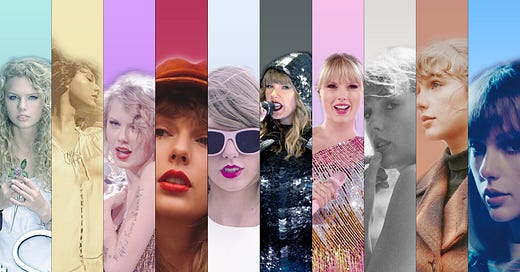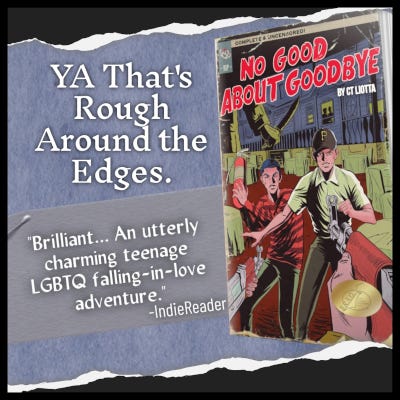Taylor Swift's Whiteness Reminds Me of My Childhood
And that's probably why she's an enormous star.
For five days this month, Taylor Swift was a major presence about a mile from my house. I live in Philly, a mile from Lincoln Financial Field where she stopped for three nights for her long sold-out Eras Tour. When I opened my windows, I could hear her performing.
If you’ve been living under a rock, Taylor Swift is a singer-songwriter who first gained recognition in the mid-2000s for her country music style and “relatable” lyrics. Born in 1989 in Reading, Pennsylvania, Swift moved to Nashville, Tennessee at age 14 to pursue a career. She released her self-titled debut album in 2006, then moved from country into pop and continued to gain popularity with subsequent albums, including "Fearless," which won Album of the Year at the 2010 Grammy Awards. She’s clearly a talent, morphing between genres and relating to her fans on social media.
Swift’s audience is mostly white. I can’t be the only one who’s noticed. A Google search for “Taylor Swift and Whiteness” would, I’m sure, give me a trove of think-pieces. In Philadelphia, however, where there are more Black people than white people, watching tens of thousands of white women and gay men descend on South Philly was weird.
I’ve been giving Swift more attention on Spotify, lately, to understand why her star is so big, and it makes sense in my head.
I grew up “away from big-city problems” in a white, rural American town not too different from the upper middle-class Philly burbs where Swift’s fans live. There’s something comforting about the themes she sings about. Essentially, they amount to either “the problem is you” or “the problem is me.” Sometimes she asks whether the problem is you or me. She also likes to remind people it’s over. Occasionally, she sings about how people make her feel good.
Compare this to Beyonce’s lauded 2016 album Lemonade, a song cycle about her decision to remain with husband Jay-Z following his infidelity, told in a generational and racial context.
The Millennial and Gen-Z intelligentsia love social issues. They praise works that center non-white creators, in part to atone for older generations making people of color personae non gratae. They tweet for hours about representation in the media.
This makes Taylor Swift an uncomfortable subject. There’s no subtext to her songs. She does not sing about structural inequity or generational trauma and does not sing about families or communities in crisis. After the deaths of Eric Garner and George Floyd, Swift doesn’t use her platform or fame to spotlight inequality or social issues. She doesn’t talk from the stage about house bills on trans issues, racial inequality, climate change, or veganism.
Instead, she leans into her middle-class suburban privilege and centers herself and her relationship angst. What galls her detractors is how popular she is—how relatable the hordes of white suburbanites find her low-stakes pain and candyfloss. They, after all, are the stars of similar soap operas and relationship dramas and want to center and legitimize their pain—not ruminate on letting others tell stories centering the generational trauma of the marginalized.
I get it. In small towns and suburbs where the black kids play football and the white kids march in the band, people want songs with all the gravity of sitting atop the hood of a car and breaking up with the soccer captain for looking at other girls.
More socially-conscious listeners, though, wish she’d use her platform to advocate for change. I have difficulty with this take, too, because it’s useless. Lizzo recently spoke in favor of trans issues at her concert. What good did it do? Did any of the attendees register to vote or write their representatives, or did it just feel good to be seen?
About 20 years ago, top-40 pop absorbed hip-hop and country music became the soundtrack of “American whiteness.” Swift came from a background of country music, but didn’t stay in her lane, and now here we are, not sure what to do with her and hating that she’s so famous.
I like her at a core level, because she’s what pop sounded like when I was a kid. Many hoped music evolved in the 21st century, but the free market has suggested otherwise.






Ahh, but she DOES encourage her audience to vote, did come out pro LGBTQ+, and increased young voter turnout in TN and other southern states in the 2020 election with a voter drive. It’s something, at least!
bruh , this is just embarrassing. You need to chill out , not everything needs to be a problem.